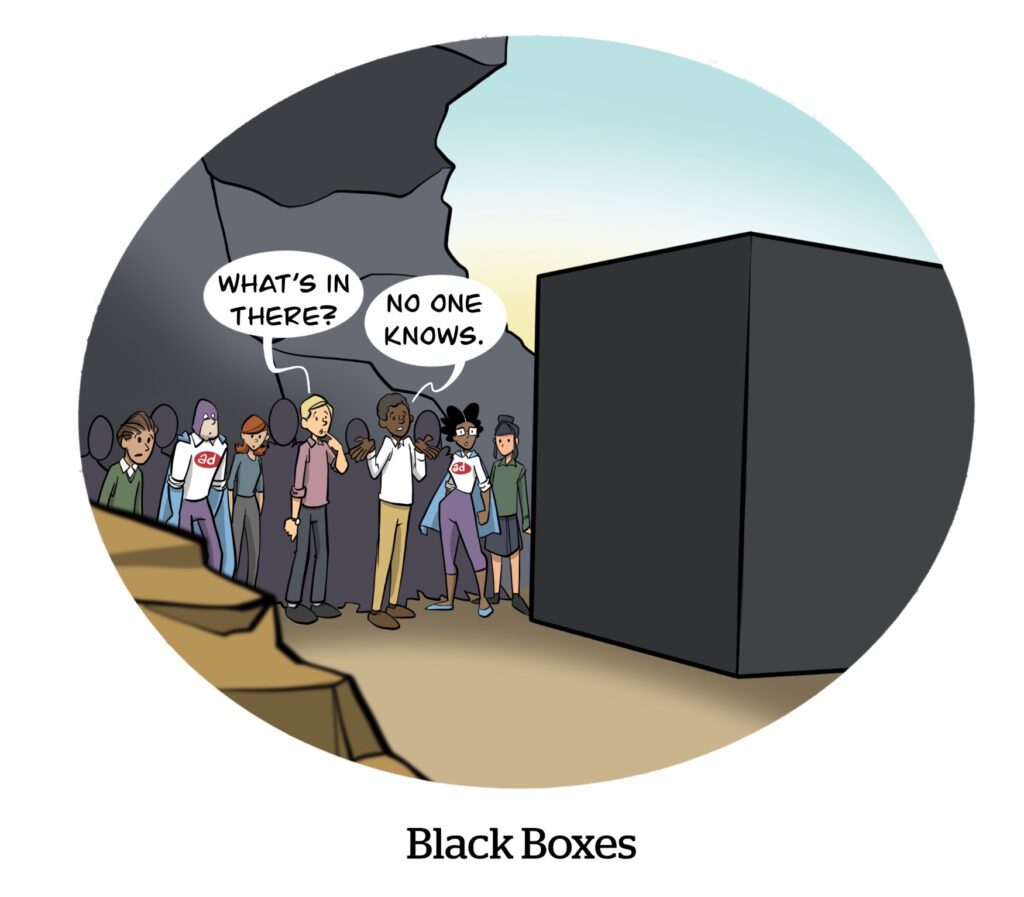Here’s today’s AdExchanger.com news round-up… Want it by email? Sign up here.
Is It All A Performance?
Pinterest is the latest walled garden to enter the AI-powered performance ring – or, rather, black box. That’s right. Pinterest has released a new machine-learning-controlled ad targeting product and is calling it, what else, Performance+, Adweek reports.
Every walled garden with a large audience and a few ad formats has copycatted Google’s Performance Max, which is leagues apart from its would-be rivals. Even Meta’s Advantage+ only combines a few sites and apps that share a similar look and feel. Google, meanwhile, is deeply entwined with people’s streaming TV viewership, music, internet service, mobile operating system, web browsing, personal mapping and email.
And PMax is in all those places.
Google would have a worthy competitor in Microsoft if the latter’s version of PMax (which it calls Performance Max, lol) was able to serve ads across Outlook email, Teams meetings, Xbox consoles and LinkedIn. But those properties are all off-limits for Microsoft’s PMax.
In other news: Yahoo announced its version of PMax last week, which at least has a slightly different name from the others. That one’s called Blueprint Performance.
Essentially YouTube
While Netflix is slow rolling its way into ad growth, YouTube is quickly becoming a Hollywood replacement.
Netflix has more than twice as many subscribers as YouTube’s services combined. But YouTube is winning big when it comes to what people consider essential entertainment, Business Insider reports.
Hub Entertainment Research has run surveys of 3,000 US consumers asking which services they say they can’t live without. And the top five this year are, in order: Spotify, YouTube Premium, YouTube, YouTube TV and YouTube Music. Sense a theme?
Last year, the rankings were Spotify, the act of reading (as in actually reading something physically or digitally!), PlayStation Plus, YouTube and Netflix.
In general, the survey response ratings reflect people’s innate preference for ad-free content of all kinds. Spotify leans on ad-free subscriptions, since it generates less revenue on average from ad-supported listeners. That’s the opposite of Netflix, which earns more from people who watch ads. And YouTube Premium is ad-free.
But now, US consumers can’t get by without an ad-supported service, as in, YouTube.
And Google has the ability to retain users more effectively than its rivals because it can bundle multiple YouTube services together (a strategy that has drawn the ire of regulators).
Netflix, on the other hand, always has to worry about churn. Viewers often cancel their subscriptions after finishing a show or two, especially when streamers raise their prices.
A Roaring Trade
Apologies for the meta post, but now’s a weird moment for ad trade publishers.
The most aggressive hirer of advertising reporters is … The Trade Desk. That’s for its content marketing and news analysis site, The Current, whose writers have even been spotted on the press list for Cannes.
And The Trade Desk’s executives are getting in on it, too. Just recently, Ian Colley, TTD’s CMO, wrote a piece “reporting” that, during a prep call for an industry event last month, speakers were asked not to pick on Google.
Google, it should be noted, was the title sponsor of the event. [Disclaimer: This was not a prep call for AdExchanger’s Programmatic I/O Las Vegas event last month, although our title sponsor was, drumroll please, the Google Privacy Sandbox.]
But TTD isn’t alone in its journalistic ambitions. Earlier this month, the ad tech info resource Marketecture acquired AdTechGod and brought on Jeremy Bloom as chief commercial officer, creating an offbeat ad tech media business with podcast and newsletter ads, community memberships and events.
And Brian Morrissey, former president and editor-in-chief of Digiday, is looking for his first full-time hire for biz dev for his venture, The Rebooting, a media industry newsletter and podcast with “growing events, lead gen and content marketing business lines,” per the post.
Welcome to the new news arena. Just like in ancient Rome, we’re all losers here.
But Wait, There’s More!
Advertisers are back at it, trying to get platforms to lift the veil on their ad-selling secrets – but this time with a savvier touch. [Digiday]
America’s TV advertisers shift spending as creators launch competing brands. [The Information]
Google alters GA4 attribution models to better associate conversions with paid search. [Search Engine Roundtable]
You’re Hired!
Adweek reporter Olivia Morley joins Brian Wieser’s Madison and Wall as a senior analyst. [post]













